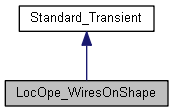|
| | LocOpe_WiresOnShape (const TopoDS_Shape &S) |
| |
| void | Init (const TopoDS_Shape &S) |
| |
| Standard_Boolean | Add (const TopTools_SequenceOfShape &theEdges) |
| | Add splitting edges or wires for whole initial shape without additional specification edge->face, edge->edge This method puts edge on the corresponding faces from initial shape. More...
|
| |
| void | SetCheckInterior (const Standard_Boolean ToCheckInterior) |
| | Set the flag of check internal intersections default value is True (to check) More...
|
| |
| void | Bind (const TopoDS_Wire &W, const TopoDS_Face &F) |
| |
| void | Bind (const TopoDS_Compound &Comp, const TopoDS_Face &F) |
| |
| void | Bind (const TopoDS_Edge &E, const TopoDS_Face &F) |
| |
| void | Bind (const TopoDS_Edge &EfromW, const TopoDS_Edge &EonFace) |
| |
| void | BindAll () |
| |
| Standard_Boolean | IsDone () const |
| |
| void | InitEdgeIterator () |
| |
| Standard_Boolean | MoreEdge () |
| |
| TopoDS_Edge | Edge () |
| |
| TopoDS_Face | OnFace () |
| | Returns the face of the shape on which the current edge is projected. More...
|
| |
| Standard_Boolean | OnEdge (TopoDS_Edge &E) |
| | If the current edge is projected on an edge, returns <Standard_True> and sets the value of <E>. Otherwise, returns <Standard_False>. More...
|
| |
| void | NextEdge () |
| |
| Standard_Boolean | OnVertex (const TopoDS_Vertex &Vwire, TopoDS_Vertex &Vshape) |
| |
| Standard_Boolean | OnEdge (const TopoDS_Vertex &V, TopoDS_Edge &E, Standard_Real &P) |
| | If the vertex <V> lies on an edge of the original shape, returns <Standard_True> and sets the concerned edge in <E>, and the parameter on the edge in. More...
|
| |
| Standard_Boolean | OnEdge (const TopoDS_Vertex &V, const TopoDS_Edge &EdgeFrom, TopoDS_Edge &E, Standard_Real &P) |
| | If the vertex <V> lies on an edge of the original shape, returns <Standard_True> and sets the concerned edge in <E>, and the parameter on the edge in. More...
|
| |
| Standard_Boolean | IsFaceWithSection (const TopoDS_Shape &aFace) const |
| | tells is the face to be split by section or not More...
|
| |
 Public Member Functions inherited from Standard_Transient Public Member Functions inherited from Standard_Transient |
| | Standard_Transient () |
| | Empty constructor. More...
|
| |
| | Standard_Transient (const Standard_Transient &) |
| | Copy constructor – does nothing. More...
|
| |
| Standard_Transient & | operator= (const Standard_Transient &) |
| | Assignment operator, needed to avoid copying reference counter. More...
|
| |
| virtual | ~Standard_Transient () |
| | Destructor must be virtual. More...
|
| |
| virtual void | Delete () const |
| | Memory deallocator for transient classes. More...
|
| |
| virtual const opencascade::handle< Standard_Type > & | DynamicType () const |
| | Returns a type descriptor about this object. More...
|
| |
| Standard_Boolean | IsInstance (const opencascade::handle< Standard_Type > &theType) const |
| | Returns a true value if this is an instance of Type. More...
|
| |
| Standard_Boolean | IsInstance (const Standard_CString theTypeName) const |
| | Returns a true value if this is an instance of TypeName. More...
|
| |
| Standard_Boolean | IsKind (const opencascade::handle< Standard_Type > &theType) const |
| | Returns true if this is an instance of Type or an instance of any class that inherits from Type. Note that multiple inheritance is not supported by OCCT RTTI mechanism. More...
|
| |
| Standard_Boolean | IsKind (const Standard_CString theTypeName) const |
| | Returns true if this is an instance of TypeName or an instance of any class that inherits from TypeName. Note that multiple inheritance is not supported by OCCT RTTI mechanism. More...
|
| |
| Standard_Transient * | This () const |
| | Returns non-const pointer to this object (like const_cast). For protection against creating handle to objects allocated in stack or call from constructor, it will raise exception Standard_ProgramError if reference counter is zero. More...
|
| |
| Standard_Integer | GetRefCount () const |
| | Get the reference counter of this object. More...
|
| |
| void | IncrementRefCounter () const |
| | Increments the reference counter of this object. More...
|
| |
| Standard_Integer | DecrementRefCounter () const |
| | Decrements the reference counter of this object; returns the decremented value. More...
|
| |

 Public Member Functions inherited from Standard_Transient
Public Member Functions inherited from Standard_Transient Public Types inherited from Standard_Transient
Public Types inherited from Standard_Transient Static Public Member Functions inherited from Standard_Transient
Static Public Member Functions inherited from Standard_Transient 1.8.13
1.8.13